Teachers
apply for mini-grants through a grant proposal distributed each year
by the district office. Applications are reviewed each fall by the
CEF Mini-Grant Committee. Those awarded mini grants are then able to
use those funds toward the cost of materials and items necessary to
complete each project.
2015 Mini-Grants
Mini-Grants for Chillicothe
School District Top $5,000
By BRITTANY TUTT C-T
October 8, 2015
The Chillicothe Education Foundation presented its annual mini grant awards for the 2015-2016 school year Wednesday morning. These grants help fund classroom projects that might not have been a strong priority otherwise.
"The grants further the daily instruction, and in many cases provide opportunities for our students that otherwise would not be available. The extra funds the Education Foundation provides for the mini grants help to extend the
district's budget. The Education Foundation's goal is not to replace the District budget, but to enhance learning opportunities and provide funds for items that go above and beyond what the district can
provide," Superintendent Dr. Roger Barnes said.
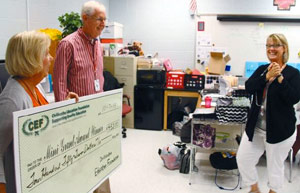
Twenty-two district teachers applied for grant money this year to help with project funding and 13 applications were approved by the
CEF's selection committee. The 13 grants handed out this year totaled $5,161.53. Twelve grants were funded by the CEF,
and one was sponsored by the Chillicothe Rotary Club.
The majority of funding for the CEF mini grants comes from an annual fundraising cocktail party hosted by the CEF Board Director Ed Milbank. The event typically raises between $17,000 and $20,000 every year; however, this year that $20,000 mark was surpassed. Money from this fundraiser also contributes to Teacher of the Year awards, Beacon of the Year awards and teacher recruitment and retention. The teachers
place a lot of thought into writing the grants and thinking of the opportunities for their students
whom they normally may not see in a regular classroom setting. The school district is very appreciative of the Education
Foundation's support and investment of students and staff.
HIGH
SCHOOL:
- Dr. Jill Watkins
- $490.16 - "How to Read Like a College
Professor"
- Ellen Duckworth
- $156 - "Let's Put the Lesson in THEIR Hands."
- Amanda Marsh
- $350 - Hornet Teacher Cafe
- Kim Kieffer
- $452 - "Gadget of Choice: Utilizing Chromebooks and Google Tools in Collaboration with iPads."
GRAND
RIVER TECHNICAL SCHOOL:
- Mike Harrington
- $500 - "Finding the Unknown Danger"
- The
Pink House, Pam Miller and Keri Campbell - $250 -
"Growing Green for Better Health"
DEWEY
ELEMENTARY:
- Adrienne Palmer
- $500 - Red Ribbon Week - Drug Awareness
CHILLICOTHE
MIDDLE SCHOOL:
- Brooke Leamer, Roman Cranmer and Darren Smith
- $250 - "Lifetime Yard Games: A Unit of Study"
FIELD
ELEMENTARY SCHOOL:
- Dan Venner
- $480 - "Let's Play the Melodical"
CENTRAL
ELEMENTARY SCHOOL:
- Melissa Englert
- $243.46 - "Breakout EDU."
- Andrea Beck
- $500 - "Beck's Backyard Book Club"
- Mandy Gatson
- $489.91 - "Ready to Read"
- Jana Shira
- $500 from the Rotary Club - Community Outreach
Leadership Group
|
There were four mini grants distributed Wednesday at the high school. Dr. Jill Watkins received a grant of $490.16 for her project
"How to Read Like a College Professor." With the grant money received, Watkins will be able to purchase two sets of classroom
books by Thomas C. Foster. These books provide a guide to literary basics, structure of literary models narrative devices from all genres and an examination of grammar style and structure of literary prose. The two texts will be used as anchor resources for required independent and class reading in the College Preparatory curriculum.
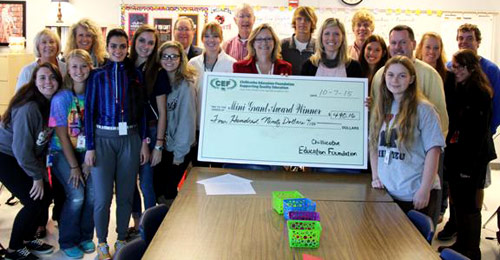
Ellen Duckworth received a $156 grant for her project
"Let's Put the Lesson in THEIR Hands." Duckworth found an online program called Nearpod that allows the students to interact with others an study the material from class, without even needing to be in the classroom. Certain parts of the program are free to a certain of storage, but it limits its features unless one pays a premium of $12 per month. The program provides all the visuals on each screen the students can see is controlled by the teacher which promotes students staying on-task, and gives options to have students answer questions and do activities on their own and submit to the teacher.
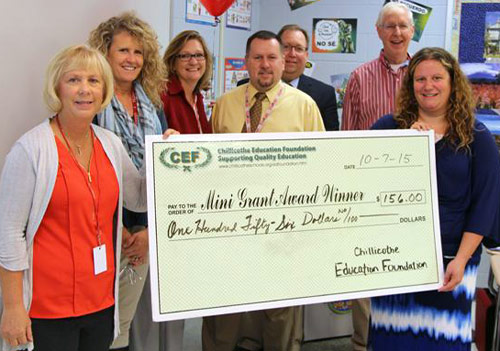
Amanda Marsh received a $350 grant for the Hornet Teacher Cafe. This money will be used to purchase groceries for the cafe and possibly a few extra things this year as well. The Hornet Cafe opened in September of 2014 and provides breakfast pizza, muffins, smoothies and coffee to teachers at Chillicothe High School. Students participating in the cafe are seen as cafe employees. They take weekly orders, make and deliver the food, bill and collect money and also clean up. The cafe is open on Mondays and Thursdays. Students learn about job skills, people skills, and hygiene skills through the Hornet Cafe.
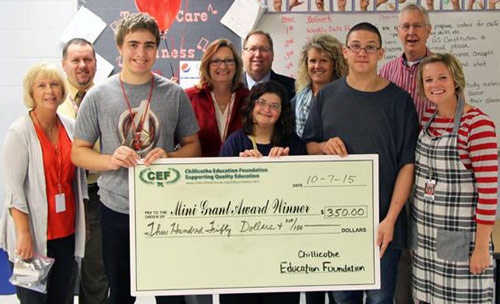
Kim Kieffer received a $452 grant for her project
"Gadget of Choice: Utilizing Chromebooks and Google Tools in Collaboration with iPads." The grant money will go toward purchasing two Chromebooks to supplement instruction with devices that have access to different features than the iPads. Chromebooks are especially helpful for special education instruction, according to Kieffer, because of its features of such things as built in
keyboard and easier capability to cut and paste when editing papers by utilizing a mouse. Students will also be able to use SD card ports and jump drives.
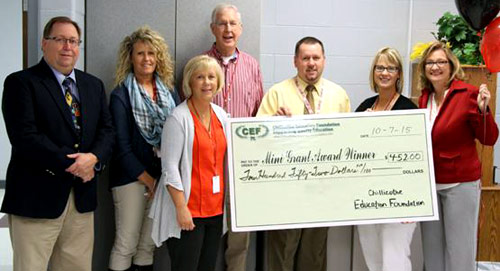
Mike Harrington at Grand River Technical School received a $500 grant for his project
"Finding the Unknown Danger." Harrington will purchase a stray voltage detector kit with a holster and integrated tester with the grant money received. The detector will actively participate in a community learning educational project for many years. Students will be able to seek, detect and actively participate in a stray voltage identification and safety
process.
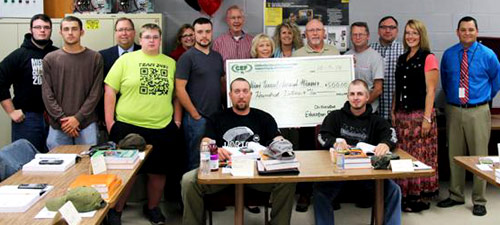
At the Pink House, Pam Miller and Keri Campbell received a $250 grant for their project
"Growing Green for Better Health." The grant money will be used to purchase a tower garden which is a vertical, aeroponic system that would fit easily in a classroom or on a
patio. It uses 10 percent less water and produces 30 percent more produce. Anything can be grown in a tower garden, and it produces all year-round. This garden will teach students about good nutrition.
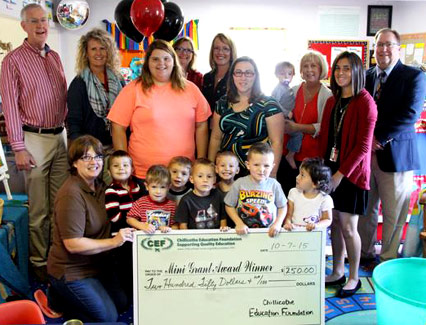
Adrienne Palmer at Dewey Elementary School received a $500 grant for Red Ribbon Week
- Drug Awareness. The grant money will go toward buying festive ribbons, pencils, stickers, sports balls, water bottles, bracelets and lollipops. Red Ribbon Week is October 26-30. Both Dewey and Field will receive these red Ribbon Week goodies.
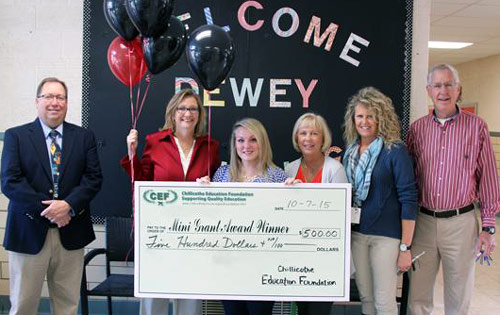
At Chillicothe Middle School, Brooke Leamer, Roman Cranmer and Darren Smith received a grant of $250 for their project
"Lifetime Yard Games: A Unit of Study." This grant money will be used to buy washer sets, cornhole sets and ladder golf sets.
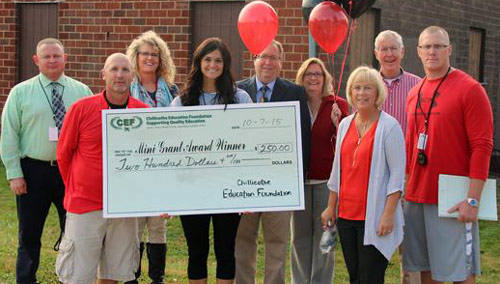
Dan Venner at Field Elementary School received a $480 grant for his project
"Let's Play the Melodical." Grant money will be put toward the purchase of 12 Melodicas and be used at Field and Central schools.
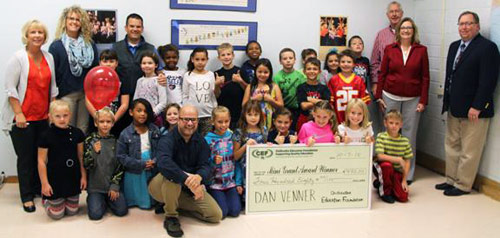
There were four grants given out at Central Elementary School. Melissa Englert received a grant of $243.46 for her project
"Breakout EDU." To reach a generation motivated by online gaming, Breakout EDU kits provide an engaging learning game format for students that teaches teamwork, problem solving, critical thinking and troubleshooting.
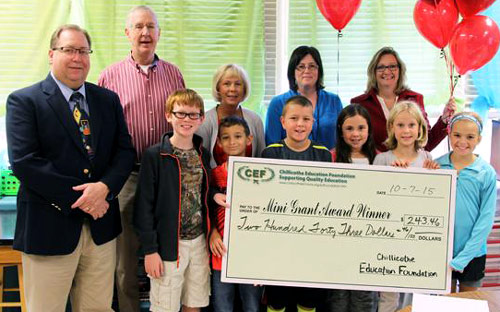
Andrea Beck received a $500 grant for her project
"Beck's Backyard Book Club." Grant money will be used to purchase engaging, educational books for students to teach reading skills.
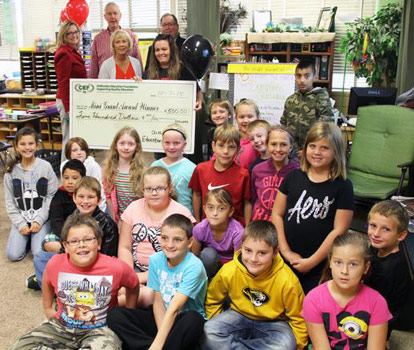
Mandy Gatson received a grant of $489.91 for her project,
"Ready to Read." Grant money will be used to purchase nine Play-Away book sets.
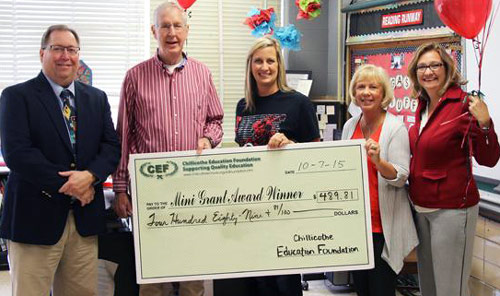
Jana Shira received a $500 grant from the Rotary Club for her leadership group at Central. Her community outreach leadership group will use the money to learn how to sew and make items for cancer patients.
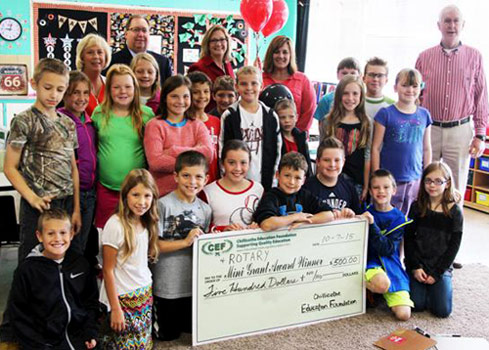
Return
to Top

|

